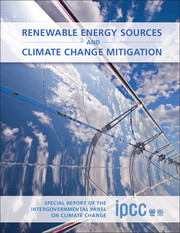 Renewable Energy Sources and Climate Change Mitigation
Renewable Energy Sources and Climate Change Mitigation Book contents
- Frontmatter
- Contents
- Section I
- Section II
- Section III
- Section IV
- Annex I Glossary, Acronyms, Chemical Symbols and Prefixes
- Annex II Methodology
- Annex III Recent Renewable Energy Cost and Performance Parameters
- Annex IV Contributors to the IPCC Special Report
- Annex V Reviewers of the IPCC Special Report
- Annex VI Permissions to Publish
- Index
Annex II - Methodology
Published online by Cambridge University Press: 05 December 2011
- Frontmatter
- Contents
- Section I
- Section II
- Section III
- Section IV
- Annex I Glossary, Acronyms, Chemical Symbols and Prefixes
- Annex II Methodology
- Annex III Recent Renewable Energy Cost and Performance Parameters
- Annex IV Contributors to the IPCC Special Report
- Annex V Reviewers of the IPCC Special Report
- Annex VI Permissions to Publish
- Index
Summary
Introduction
Parties need to agree upon common data, standards, supporting theories and methodologies. This annex summarizes a set of agreed upon conventions and methodologies. These include the establishment of metrics, determination of a base year, definitions of methodologies and consistency of protocols that permit a legitimate comparison between alternative types of energy in the context of climate change phenomena. This section defines or describes these fundamental definitions and concepts as used throughout this report, recognizing that the literature often uses inconsistent definitions and assumptions.
This report communicates uncertainty where relevant, for example, by showing the results of sensitivity analyses and by quantitatively presenting ranges in cost numbers as well as ranges in the scenario results. This report does not apply formal IPCC uncertainty terminology because at the time of approval of this report, IPCC uncertainty guidance was in the process of being revised.
Metrics for analysis in this report
A number of metrics can simply be stated or are relatively easy to define. Annex II provides the set of agreed upon metrics. Those which require further description are found below. The units used and basic parameters pertinent to the analysis of each RE type in this report include:
International System of Units (SI) for standards and units
Metric tonnes (t) CO2, CO2eq
Primary energy values in exajoules (EJ)
IEA energy conversion factors between physical and energy units
Capacity: GW thermal (GWt), GW electricity (GWe)
Capacity factor
[…]
- Type
- Chapter
- Information
- Renewable Energy Sources and Climate Change MitigationSpecial Report of the Intergovernmental Panel on Climate Change, pp. 973 - 1000Publisher: Cambridge University PressPrint publication year: 2011
- 40
- Cited by


